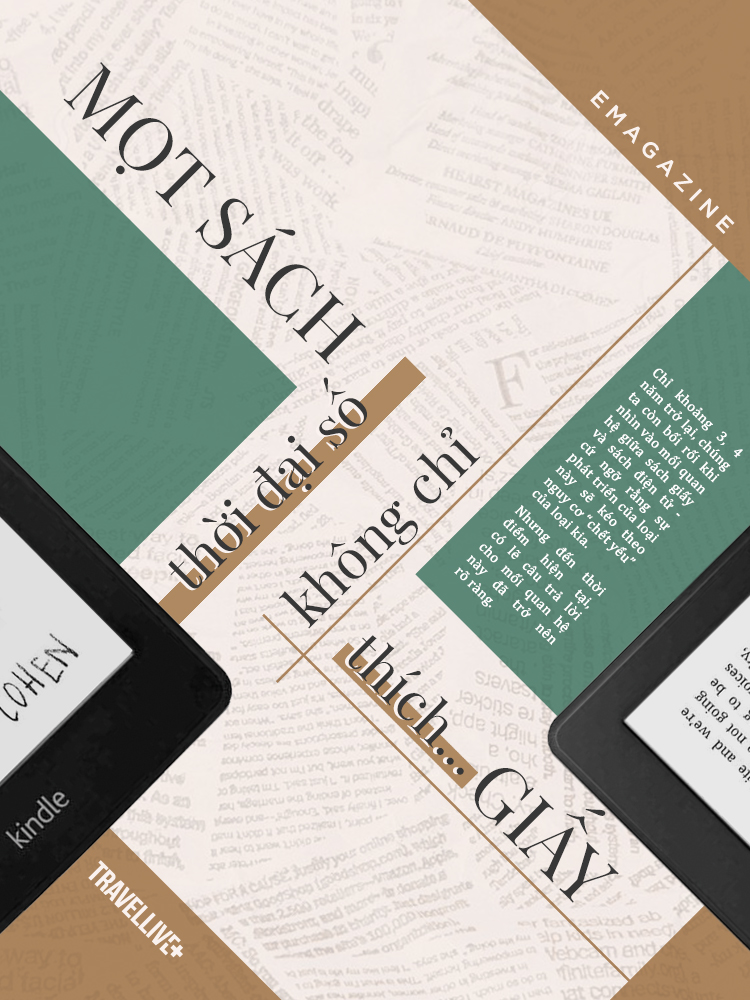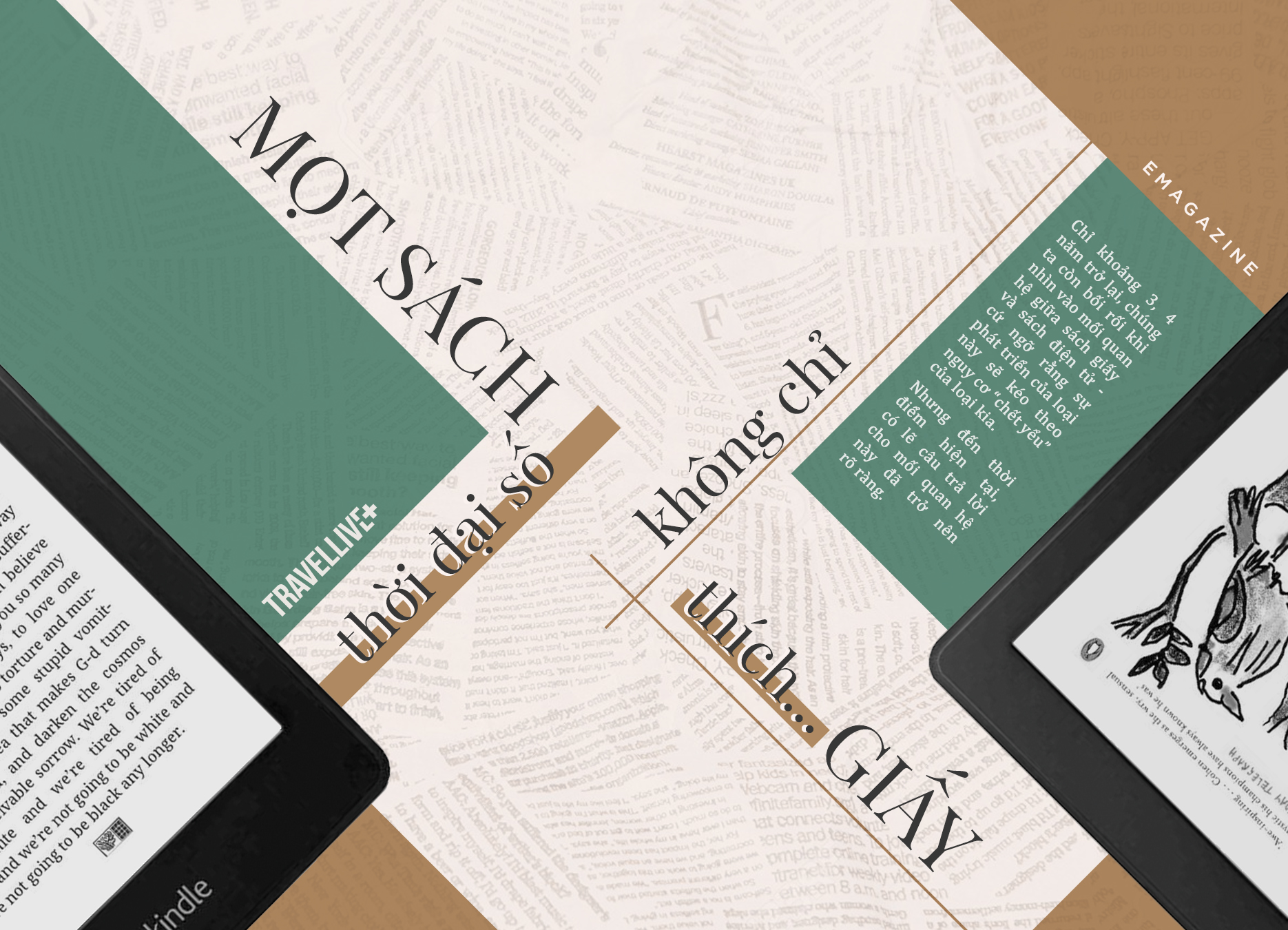Just three or four years ago, we were confused about the relationship between paper books and e-books – we thought that the development of one would inevitably lead to the premature demise of the other. But now, perhaps the answer to this relationship has become clear.
________
On July 18th, the "Books in Hand, Learning During Lockdown" program delivered thousands of books and hundreds of ebooks and audiobooks to people under lockdown and quarantine in Ho Chi Minh City. This is a small testament to the fact that ebooks and audiobooks are now as widely accepted as physical books. In fact, during this critical period of the pandemic, these types of books have become a "lifeline" for the publishing industry, for readers, and a means of connecting people.

Audiobooks emerged and were used in the US in the 1930s, but primarily contained poetry, so they weren't very popular. In recent years, with the development of technology worldwide, reading culture has inevitably shifted. That's when audiobooks and e-books have started to make a comeback and are being more widely accepted.
With over 542,000 results in 0.39 seconds on Google's search engine, the concepts of ebooks and audiobooks are becoming increasingly popular among book lovers. These are also two of the most prominent representatives of reading culture in the digital age.
With just a smart electronic device, readers anywhere – whether on the bus, doing housework, or exercising – can listen to, read, and absorb knowledge in a simple, fast, and effective way. Information content is compressed into electronic files or transmitted as audio through human voice narration. Each ebook is summarized into several small chapters; with audiobooks, each segment typically lasts about 10-20 minutes.
Not limited to the content of a single book, audiobook enthusiasts can also access a wide variety of information, from economics and culture to life tips and entertainment. Among these, several podcast channels, though relatively new to the market, have received positive reviews from users, such as The Present Writer (Chi Nguyen), Amateur Psychology (Nguyen Doan Minh Thu), Have A Sip (Vietcetera), and Listen to Podcast (VnExpress)...
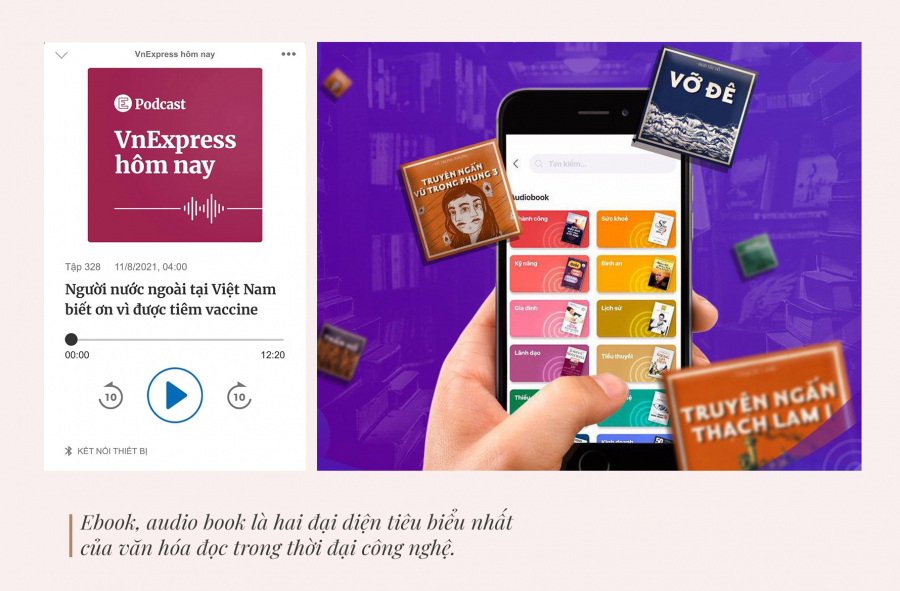

Technology has become the most optimal solution for connecting people with knowledge and global civilization. In the context of the ongoing Covid-19 pandemic worldwide, publishing houses have reduced their purchases of copyrighted books due to the cancellation of many major copyright book fairs. The London Book Fair in March, the Bologna Book Fair in April, and the Frankfurt Book Fair in October – all major book fairs around the world – have been replaced by online meetings via platforms such as Zoom, Microsoft Teams, and Google Meet.
"The shift from offline to online formats has become an essential requirement to adapt to the times. Moreover, the younger generation now has access to technology very early, so it's not surprising that they will also become consumers of digital knowledge," said Mr. Nguyen Canh Binh, Chairman of Alpha Books publishing company.
According to Mr. Binh, Alpha Books alone has reached nearly 2 million users via Facebook, 300,000 users via its website, and other platforms such as YouTube and Instagram. Recently, Alpha Books has launched a new project – a new way to access books: online book rental. Through this innovative book rental service, individuals, families, and businesses can comfortably read books while saving money during these difficult economic times, and they don't need to go to physical stores to find and rent books.
Another new form of audiobook that deserves mention is Voiz FM. In early 2020, WEWE Technology Joint Stock Company officially launched the Voiz FM application for listening to copyrighted podcasts and audiobooks, and presented a trial version of its AI Voice (artificial intelligence voice) product. In a short time, this application attracted a large number of users, even becoming a new entertainment option during the pandemic. A survey showed that when asked 10 young Vietnamese people about a quality audiobook application, 6 of them answered Voiz FM.
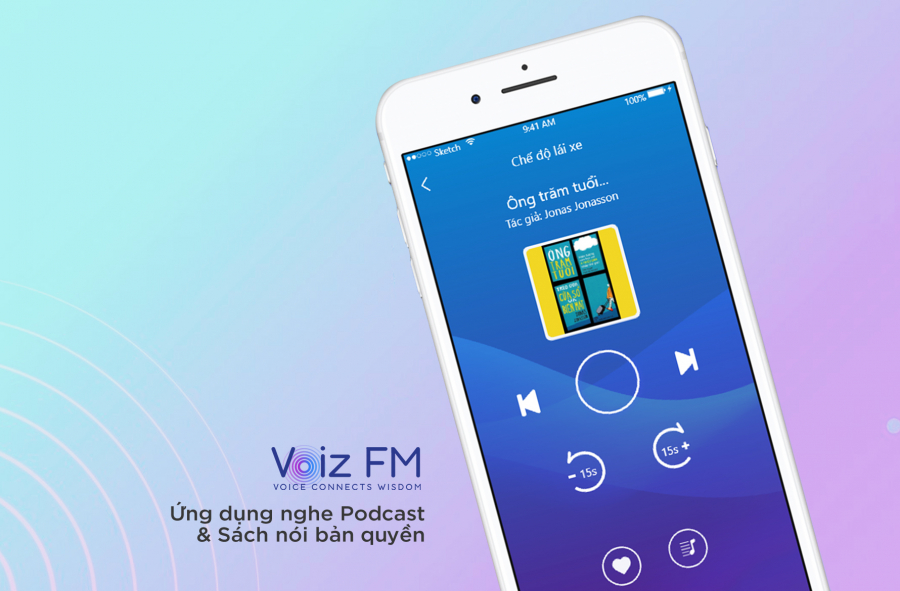
Over the past two years, many bookworms have admitted that they love not only paper books but also smartphones – a convenient and "smart" tool that integrates almost everything they need. The trend of shifting reading methods towards e-books and audiobooks is completely natural, as these types of books perfectly fulfill the task of providing information and knowledge, are cheaper than paper books, are convenient to use, and are especially suitable for the current social distancing context.

While convenient, e-reading methods obviously cannot replace the direct experiences that physical books have always offered readers. Surprisingly, far from being overshadowed by e-readers, the culture of physical books in Vietnam has become even more vibrant recently. From foreign language books, used books, and collectibles to new bookstores with unique styles, the culture of physical books seems to have continuously developed and expanded, encompassing publishing mindsets, business models, and reading habits.
Starting with The Bookworm Hanoi, one of Vietnam's largest foreign language bookstores with over 30,000 titles. Originally located in a small alley on Chau Long Street, The Bookworm has now become one of the most successful cafe-bookstores in the capital. Here, you can immerse yourself in books while admiring objects that bear the imprint of Vietnamese and Hanoi's culture and history, preserved by the owner, Mr. Hoang Van Truong.
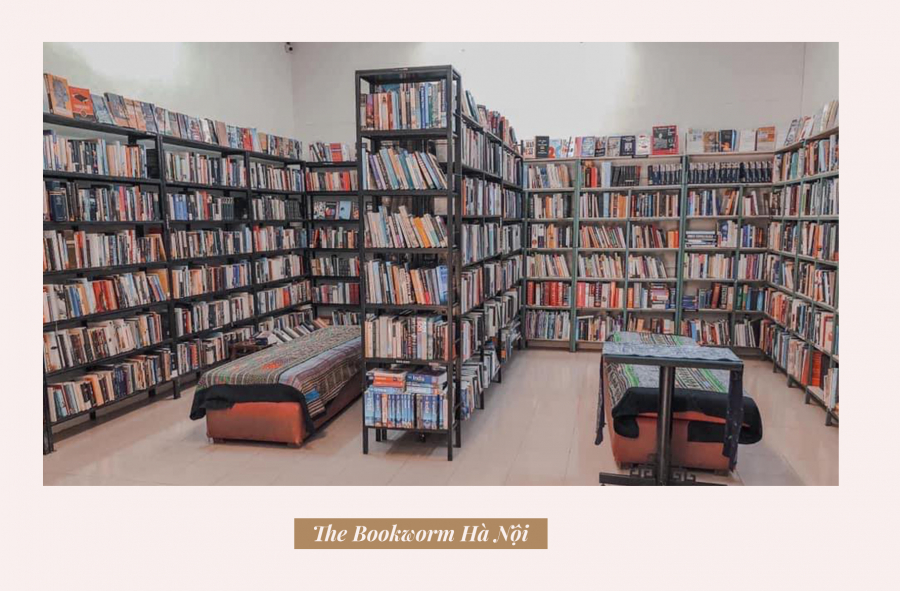
Not only in major cities, but also in Bac Ninh, for the past three months, images of a unique bookstore have been continuously shared on social media. This bookstore, with its impressive design, has shattered all familiar perceptions of a traditional bookstore.
Tuệ Phong (pen name) - owner of Tịnh Đàm Bookstore (Bắc Ninh) said: “Tịnh Đàm's business model is a three-in-one model including books, coffee, and community learning clubs, primarily focusing on books with over 3,000 titles in various fields. When my colleagues and I opened the bookstore, we hoped it would be a place where young people could learn, access diverse knowledge, and exchange ideas directly in a civilized environment.”
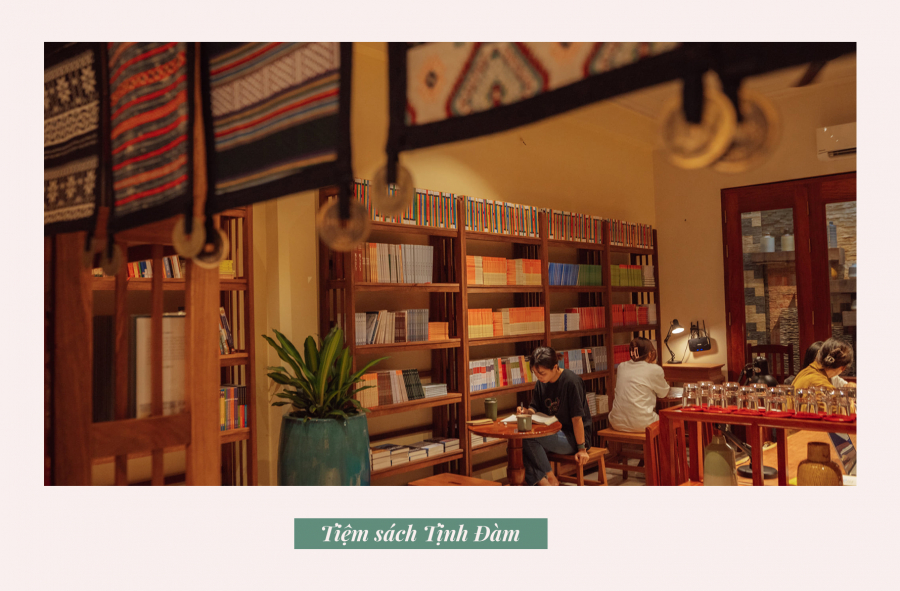
The Bookworm, or Tinh Dam Bookstore, is a prime example of innovation in the form of reading physical books. Along with The Bookshelf, Nest Book, Gac Xep Bookstore, and Box Bookstore, these bookstores share the common characteristic of being founded by young people with in-depth knowledge of books, boasting impressive design spaces, and becoming ideal places to connect people with similar tastes and reading styles without the need for any technological devices.
Furthermore, the books here are very carefully selected, with a large selection of foreign books, ensuring both quality and appearance before reaching readers.
Bestsellers, books on how to get rich, romance novels… these genres no longer dominate the reading market as they did before 2021. Instead, these “new” bookstores are seeing the rise of books that are difficult to read or require a “slow” reading pace, including research books, philosophy books, classic literature… and art books, with high intellectual value.
On the other hand, some new publishing houses are also choosing a business model that directs readers towards sophisticated, distinctive publications that stand out from the crowd. A prime example is Riobook, with its books meticulously crafted in terms of content, subject matter, aesthetics, and design. Recently, Riobook even launched a thoughtful "reading promotion" program: offering complimentary high-quality coffee with every book purchase.
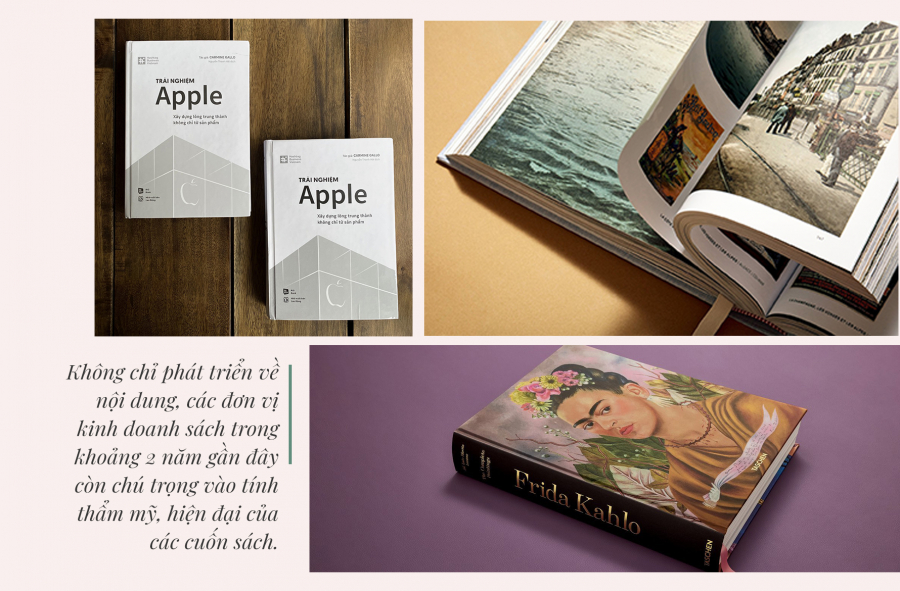
Just three or four years ago, we were confused about the relationship between paper books and e-books – we thought that the development of one would inevitably lead to the premature demise of the other. But now, perhaps the answer to this relationship has become clear. The existence of paper books and e-books does not depend on each other, but rather on the level of human knowledge and education. As long as our need for knowledge continues to grow and society remains civilized, both paper books and e-books will continue to develop together.
Therefore, looking at the "remarkable" development of both print and e-books in Vietnam over the past two years, we can consider it a positive sign.

In the 1930s, the early mornings of Hanoians often began with the cries of children calling out: "Dong Phap," "Trung Bac Tan Van newspaper," or "Gia Dinh newspaper"... these were the main sources of intellectual nourishment for Hanoians before the advent of electronic means of communication.
Civil servants would read newspapers while eating breakfast before going to work, while wealthier families subscribed to monthly and annual newspapers and received special editions, including Tet (Lunar New Year) editions. Reading became a habit for Hanoians back then; people would wait for the publication date to buy newspapers and books that still smelled of fresh ink. Books were only trimmed on two edges, while the top edge remained folded, requiring a knife to cut it open before reading, making it easy to distinguish between new and old books.
On the day the capital was liberated, in the 1960s and 1970s, some books were first published in tens of thousands of copies. Later, they were reprinted many times, totaling three or four hundred thousand copies, the most notable example being...Prison Diaryby Ho Chi Minh.
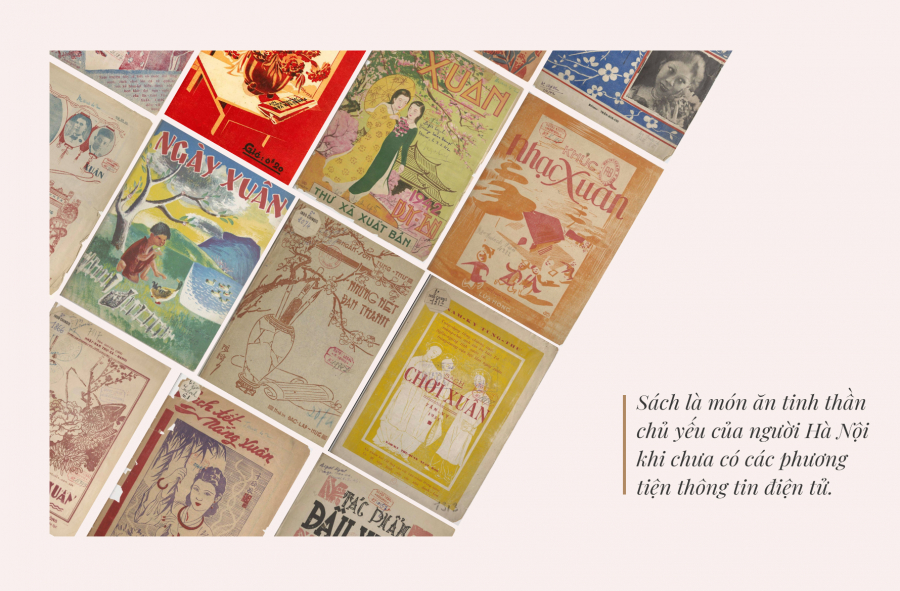


 VI
VI EN
EN



